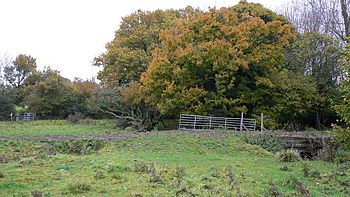Oakhanger Stream facts for kids
Quick facts for kids Oakhanger Stream |
|
|---|---|

Footbridge over the Oakhanger Stream near the village of Oakhanger
|
|
| Country | England |
| Counties | Hampshire |
| Districts / Boroughs | East Hampshire |
| Towns | Selborne |
| Physical characteristics | |
| Main source | Well Head Noar Hill, Selborne 415 ft (126 m) 51°05′21″N 0°56′24″W / 51.089140°N 0.94002732°W |
| River mouth | River Slea Kingsley 235 ft (72 m) 51°07′57″N 0°52′52″W / 51.132491°N 0.88098100°W |
| Length | 8.343 km (5.184 mi) |
| Basin features | |
| River system | Wey catchment |
| Basin size | 18.703 km2 (7.221 sq mi) |
| Tributaries |
|
The Oakhanger Stream is a small river in Hampshire, England. It is a tributary, which means it's a smaller river that flows into a larger one. The Oakhanger Stream joins the River Slea.
Contents
Where Does the Stream Flow?
The Oakhanger Stream starts at a place called Well Head. This is at the bottom of Noar Hill, south of Selborne.
From Source to Selborne
The very first part of the stream is known as the Well Head Stream. In 1894, its path was changed. This was done to bring water to the village of Selborne. It was a way to remember Gilbert White, a famous naturalist.
Journey Through Villages
As the stream flows, it reaches Dorton, north of Selborne. Here, another small stream, the Gracious Street Stream, joins it. After this point, it becomes known as the Oakhanger Stream.
The stream then flows through the village of Oakhanger. It passes along the eastern edge of Shortheath Common. Finally, near Kingsley Mill, it meets the Kingsley Stream. Together, they form the River Slea.
Watermills Along the Stream
For a long time, rivers like the Oakhanger Stream were used to power machines. These machines were often found in buildings called watermills. Watermills used the force of flowing water to turn large wheels. These wheels then powered machinery, often for grinding grain into flour.
Old Mills on the Oakhanger Stream
At least two corn mills once operated on the Oakhanger Stream. One was the Old Mill in Selborne. This building is now a private home. It is a listed building, which means it's protected because of its historical importance.
Another mill was Dorton Mill. This mill was located between Selborne and Oakhanger. Today, there are no visible signs left of Dorton Mill.
How Healthy is the Water?
The Environment Agency checks the water quality of rivers in England. They give each river a score for its overall health. This score can be one of five levels: high, good, moderate, poor, or bad.
What Water Quality Means
Scientists look at several things to decide a river's health.
- Biological status checks the types and numbers of living things in the water. This includes tiny invertebrates (like insects without backbones), flowering plants, and fish.
- Chemical status looks at different chemicals in the water. They compare the amounts of these chemicals to safe levels. Chemical status is either rated good or fail.
Oakhanger Stream's Water Quality in 2019
Here's how the Oakhanger Stream's water quality was rated in 2019:
| Section | Ecological Status |
Chemical Status |
Overall Status |
Length | Catchment | Channel |
|---|---|---|---|---|---|---|
| Oakhanger Stream | Poor | Fail | Poor | 8.343 km (5.184 mi) | 18.703 km2 (7.221 sq mi) |
The table shows that the Oakhanger Stream's water quality was rated as "poor" overall. This means it's not as healthy as it should be.
Why the Water Quality Isn't Good
The main reasons the Oakhanger Stream didn't reach a good status are pollution from farms and waste water.
- Agricultural pollution can come from fertilizers and pesticides used on farms. These chemicals can wash into the stream.
- Waste water pollution comes from treated water released from homes and businesses. Even treated water can sometimes contain things that harm the river.
These types of pollution can make it harder for plants and animals to live and thrive in the stream.
 | Selma Burke |
 | Pauline Powell Burns |
 | Frederick J. Brown |
 | Robert Blackburn |

